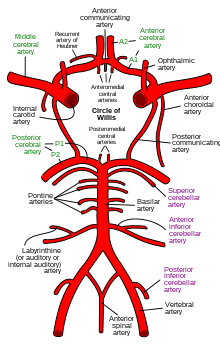Raymond–Céstan syndrome
Appearance
| Raymond–Céstan syndrome | |
|---|---|
| Other names | upper dorsal pontine syndrome, |
 | |
| Basillar artery runs down the middle(in above image) and blockage is cause of this condition. Diagram of the arterial circulation at the base of the brain (inferior view). | |
| Diagnostic method | Cect/ncct brain, mri brain |
Raymond–Céstan syndrome is caused by blockage of the long circumferential branches of the basilar artery.[1] It was described by Fulgence Raymond and Étienne Jacques Marie Raymond Céstan.[2] Along with other related syndromes such as Millard–Gubler syndrome, Foville's syndrome, and Weber's syndrome, the description was instrumental in establishing important principles in brain-stem localization.[3]
Presentation
[edit]- Ipsilateral ataxia and coarse intention tremor (damage to superior and middle cerebellar peduncle)
- Ipsilateral paralysis of muscles of mastication and sensory loss in face (damage to sensory and motor nuclei and tracts of CN V)
- Contralateral loss of sensory modalities in the body (damage to spinothalamic tract and medial lemniscus)
- Contralateral hemiparesis of face and body (damage to corticospinal tract) may occur with ventral extension of lesion
- Horizontal gaze palsy may occur (as in lower dorsal pontine syndrome)
Diagnosis
[edit]This section is empty. You can help by adding to it. (October 2017) |
Treatment
[edit]This section is empty. You can help by adding to it. (October 2017) |
References
[edit]- ^ http://www.clineu-journal.com/article/S0303-8467(07)00181-3/abstract[permanent dead link]
- ^ "Céstan-Chenais syndrome". Archived from the original on 2014-07-27. Retrieved 2014-07-20.
- ^ Silverman, Isaac E. (1995-06-01). "The Crossed Paralyses: The Original Brain-Stem Syndromes of Millard-Gubler, Foville, Weber, and Raymond-Cestan". Archives of Neurology. 52 (6): 635–638. doi:10.1001/archneur.1995.00540300117021. ISSN 0003-9942. PMID 7763214.
Further reading
[edit]- Kim, JS; Lee, JH; Im, JH; Lee, MC (Jun 1995). "Syndromes of pontine base infarction. A clinical-radiological correlation study". Stroke: A Journal of Cerebral Circulation. 26 (6): 950–5. doi:10.1161/01.STR.26.6.950. PMID 7762044.
- Krasnianski, M; Neudecker, S; Zierz, S (Aug 2004). "[Classical crossed pontine syndromes]". Fortschritte der Neurologie · Psychiatrie (in German). 72 (8): 460–8. doi:10.1055/s-2004-818392. PMID 15305240. S2CID 144167622.
